
The Clash were an English rock band that formed in London in 1976 and were key players in the original wave of British punk rock. Billed as "The Only Band That Matters", they used elements of reggae, dub, funk, ska, and rockabilly, and they contributed to the post-punk and new wave movements that followed punk. For most of their recording career, the Clash consisted of lead vocalist and rhythm guitarist Joe Strummer, lead guitarist and vocalist Mick Jones, bassist Paul Simonon, and drummer Nicky "Topper" Headon.
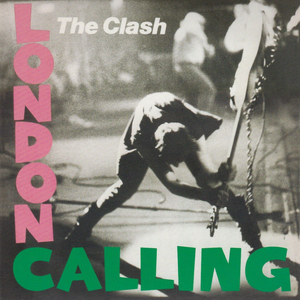
London Calling is the third studio album by the English rock band the Clash. It was originally released as a double album in the United Kingdom on 14 December 1979 by CBS Records, and in the United States in January 1980 by Epic Records.
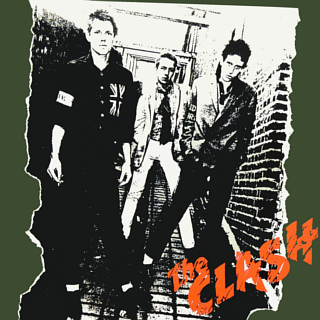
The Clash is the debut studio album by the English punk rock band the Clash, released on 8 April 1977 through CBS Records. Recorded and mixed over three weeks in February 1977 for £4,000, it would go on to reach No. 12 on the UK charts, and has been included on many retrospective rankings as one of the greatest punk albums of all time.

Give 'Em Enough Rope is the second studio album by the English punk rock band the Clash, released on 10 November 1978 through CBS Records. It was their first album released in the United States, preceding the US version of the self-titled studio album. The album was well received by critics and fans, peaking at number two in the United Kingdom Albums Chart, and number 128 in the Billboard 200. The album is tied with Combat Rock (1982) for being the highest-charting album for the Clash in their native United Kingdom.

Sandinista! is the fourth studio album by the English punk rock band the Clash. It was released on 12 December 1980 as a triple album containing 36 tracks, with 6 songs on each side. It crosses various genres including funk, reggae, jazz, gospel, rockabilly, folk, dub, rhythm and blues, calypso, disco, and rap. For the first time, the band's songs were credited to the Clash as a group, rather than to Joe Strummer and Mick Jones. The band agreed to a decrease in album royalties in order to release the 3-LP at a low price.

Paul Gustave Simonon is an English musician and artist best known as the bassist for the Clash. More recent work includes his involvement in the supergroup the Good, the Bad & the Queen and playing on the Gorillaz album Plastic Beach in 2010, which saw Simonon reunite with The Clash guitarist Mick Jones and Blur frontman Damon Albarn – and which also led to Simonon becoming the live band's touring bassist for Gorillaz's Escape to Plastic Beach Tour. Simonon is also an established visual artist.

Nicholas Bowen "Topper" Headon is an English drummer and multi-instrumentalist, best known as the drummer of punk rock band The Clash. Known for his contributions to the drumming world, Headon was inducted in the Rock and Roll Hall of Fame with the rest of The Clash in 2003.
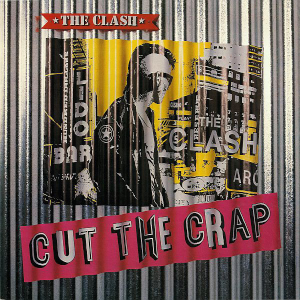
Cut the Crap is the sixth and final studio album by the English punk band the Clash, released on 4 November 1985 by CBS Records. It was recorded in early 1985 at Weryton Studios, Munich, following a turbulent period: co-founder, lead guitarist and co-principal songwriter Mick Jones and drummer Topper Headon had been dismissed by lead vocalist Joe Strummer and bassist Paul Simonon. Jones and Headon were replaced by three unknowns: guitarists Vince White and Nick Sheppard and drummer Pete Howard. During the tense recording sessions, Clash manager Bernie Rhodes and Strummer fought each other for control over the band's songwriting and musical direction.

Michael Geoffrey Jones is a British musician, singer, songwriter, and record producer best known as co-founder and lead guitarist of punk rock band the Clash, until his dismissal by frontman Joe Strummer in 1983. In 1984, he formed Big Audio Dynamite with Don Letts. Jones has played with the band Carbon/Silicon along with Tony James since 2002 and was part of the Gorillaz live band for a world tour in 2010–2011. In late 2011, Jones collaborated with Pete Wylie and members of the Farm to form the Justice Tonight Band.

"White Riot" is a song by English punk rock band the Clash, released as the band's first single in March 1977 and also included on their self-titled debut album.

"(White Man) In Hammersmith Palais" is a song by the English punk rock band the Clash. It was originally released as a 7-inch single, with the b-side "The Prisoner", on 16 June 1978 through CBS Records.

"Complete Control" is a song by The Clash, released as a 7" single and featured on the U.S. release of their debut album.
"The Guns of Brixton" is a song by the English punk rock band the Clash, originally released on their 1979 album London Calling. It was written and sung by bassist Paul Simonon, who grew up in Brixton, South London. The song has a strong reggae influence, reflecting the culture of the area and the reggae gangster film The Harder They Come.
"I'm So Bored with the U.S.A." is a song by British punk rock band the Clash, featured on their critically acclaimed 1977 debut album, which was released in the United States in July 1979 as their second album after Give 'Em Enough Rope. It was the album's third track in the original version and second in the US version.

"Tommy Gun" is a song by the British punk rock band The Clash, released as the first single from their second album Give 'Em Enough Rope (1978).
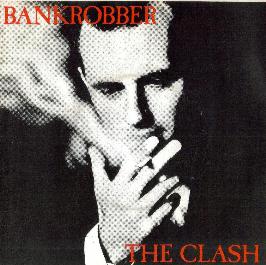
"Bankrobber" is a song by English punk rock band the Clash. The song was not released on any of their studio albums, instead appearing on their compilation Black Market Clash. Upon its 1980 release as a single it peaked at number 12 on the UK Singles Chart, and at number 14 on both the Irish Singles Chart and the New Zealand Singles Chart.
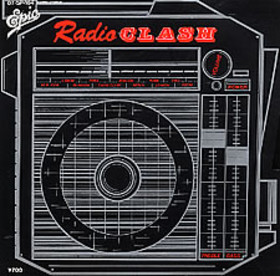
"This Is Radio Clash" is a song by the English punk rock band the Clash. It was released as a single in November 1981 on various formats. The song was performed live before its release, beginning with the Impossible Mission Tour of April and May 1981. A live performance was also televised on Tom Snyder's Tomorrow show on 5 June 1981.
Capital Radio is a song and an extended play by the English punk rock band the Clash. The original song has been included as "Capital Radio" or "Capital Radio One" on the Capital Radio EP (1977), Black Market Clash (1980), The Story of the Clash, Volume 1 (1988), Clash on Broadway (1991), From Here to Eternity: Live (1999), The Essential Clash (2003), and Singles Box (2006).
"Janie Jones" is a song by the English punk rock band the Clash. It is the opening track on their debut album, The Clash (1977). The song is named after Janie Jones, a cabaret singer who organised sex parties at her Kensington home.
"Garageland" is a song by English punk rock band The Clash featured as the final track for their 1977 debut album The Clash.















